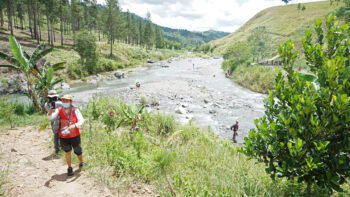CAGAYAN DE ORO CITY (MindaNews/05 September) — It’s getting to be monotonous learning that still another raid has taken place in some barangay, town, or business compound—with the raiders getting away unscathed, leaving destruction or murder in their wake.
Just days ago, raiders swooped down on a private subdivision in Bukidnon’s Manolo Fortich Town, just half an hour’s drive from Cagayan de Oro, and made off with the weapons of the subdivision’s security unit, escaping before anyone could react.
It was the latest in a series of raids in the province; each one netting the raiders more weapons and ammunition from local security units. In most cases, they also destroy or disable equipment, facilities, or infrastructure as they’ve done several times to Del Monte Philippines Inc.
A week before that, a banana plantation, also belonging to Del Monte, was raided in Tubay Town in Agusan del Norte. Then again the week before that, two soldiers were abducted while on civilian duty in Impasug-ong Town, Bukidnon. They are now “prisoners of war” of the New People’s Army.
*****
These outlaws are amassing quite an arsenal from their take in these raids, which they seem to be able to do at will—in the process, they embarrass both civilian and armed forces officials.
That they do so with great success every time ought to be enough to open the eyes of civilian, police, and military authorities to the reality that current arrangements, strategies, and protocols are utterly inadequate.
To the community, it is obvious that neither their civil officials nor the police and military are up to their mission of securing people, property, or community, let alone stopping criminality—a failure that should be of the greatest concern to them.
Every time a raid occurs, all we hear are the usual noises about launching hot pursuit operations, barricading roadways traversed by the raiders (which they’re not likely to use so soon after!), and lame admonitions about the need for vigilance and cooperation of the people.
But the raids go on anyway—successfully! You’d think it would rouse officials to earnestly review the security situation and figure out what can be done or devise more effective strategies.
*****
The least they can do is to make clear to everyone what role or action to take when threats arise. This holds true for both military and environmental threats. Appeals for cooperation would be more fruitful also if they hold security drills in the community to heighten people’s awareness and readiness.
Such disruptive events and their frequency reveal how weak, disorganized, and easily infiltrated our barangays or communities are. It shows them to be readily intimidated, prone to disarray when their jurisdiction is trespassed or assaulted.
It also shows how poorly led they are, left helpless by their own officials in times of emergency, and sorely lacking in ability to cope.
Civil officials—barangay chair, kagawads, mayors, councilors—should head efforts to devise, in collaboration with military and police authorities, protective or defensive measures for such contingencies, including overt and covert mobilization of constituents.
As for the citizenry, such incidents should not only alarm them but cause them to demand that their officials take appropriate action, exercise leadership, and be heroic if necessary.
*****
In general, people should view security matters as everyone’s concern, not just of the police or the armed forces. It’s people after all who are victimized by raiders and other predatory forces.
And when the police or military say they cannot combat criminality and other threats without the people’s help, they should be heeded. Everyone should be concerned and act affirmatively.
To think of security as primarily a matter for the police and military to handle will only lull others into thinking they have no responsibility for securing themselves, their property, or their community.
This attitude is reinforced by the practice of reporting incidents to the police or military only when trouble develops, side-lining the civil authorities.
Governors, mayors, or barangay chairmen should not so readily surrender their leadership to the armed forces. They should not hole up in their offices during emergencies. That’s when their leadership is needed most.
Peace and order, harmony, and cooperation, are part of the mandate of political leadership.
Manny is former UNESCO regional director for Asia-Pacific; secretary-general, Southeast Asia Publishers Association; director, development academy of Philippines; member, Philippine Mission to the UN; vice chair, Local Government Academy; member, Cory Govt’s Peace Panel; awardee, PPI-UNICEF outstanding columnist. He is president/national convenor, Gising Barangay Movement Inc. valdehuesa@gmail.com







